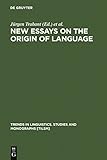New Essays on the Origin of Language / ed. by Jürgen Trabant, Sean Ward.
Material type: TextSeries: Trends in Linguistics. Studies and Monographs [TiLSM] ; 133Publisher: Berlin ; Boston : De Gruyter Mouton, [2011]Copyright date: ©2001Edition: Reprint 2011Description: 1 online resource (258 p.) : 1 plateContent type:
TextSeries: Trends in Linguistics. Studies and Monographs [TiLSM] ; 133Publisher: Berlin ; Boston : De Gruyter Mouton, [2011]Copyright date: ©2001Edition: Reprint 2011Description: 1 online resource (258 p.) : 1 plateContent type: - 9783110170252
- 9783110849080
- 401 21
- P116 .N48 2001eb
- online - DeGruyter
- Issued also in print.
| Item type | Current library | Call number | URL | Status | Notes | Barcode | |
|---|---|---|---|---|---|---|---|
 eBook
eBook
|
Biblioteca "Angelicum" Pont. Univ. S.Tommaso d'Aquino Nuvola online | online - DeGruyter (Browse shelf(Opens below)) | Online access | Not for loan (Accesso limitato) | Accesso per gli utenti autorizzati / Access for authorized users | (dgr)9783110849080 |
I-IV -- Contents -- Introduction: New perspectives on an old academic question -- 1. Biological aspects of the question -- On the subcortical bases of the evolution of language -- The origin of the human language faculty: the language amoeba hypothesis -- 2. The first language -- The apparent paradox of language evolution: can Universal Grammar be explained by adaptive selection? -- Elementary forms of linguistic organisation -- From potential to realisation: an episode in the origin of language -- Protothought had no logical names -- The birth of rules -- How language changed the genes: toward an explicit account of the evolution of language -- 3. Beyond biolinguistics -- The narration "instinct": signalling behaviour, communication, and the selective value of storytelling -- Taxonomic controversies in the twentieth century -- The origin of origins: a play in five acts, with a prologue im Himmel and an epilogue auf der Erde -- References -- Index
restricted access online access with authorization star
http://purl.org/coar/access_right/c_16ec
The contributions to this volume reflect the state of the art in the renewed discussion on the origin of language. Some of the most important specialists in the field - life scientists and linguists - primarily examine two aspects of the question: the origin of the language faculty and the evolution of the first language. At stake is the relation between nature and culture and between universality and historical particularity as well as cognition, communication, and the very essence of language.
Issued also in print.
Mode of access: Internet via World Wide Web.
In English.
Description based on online resource; title from PDF title page (publisher's Web site, viewed 28. Feb 2023)


